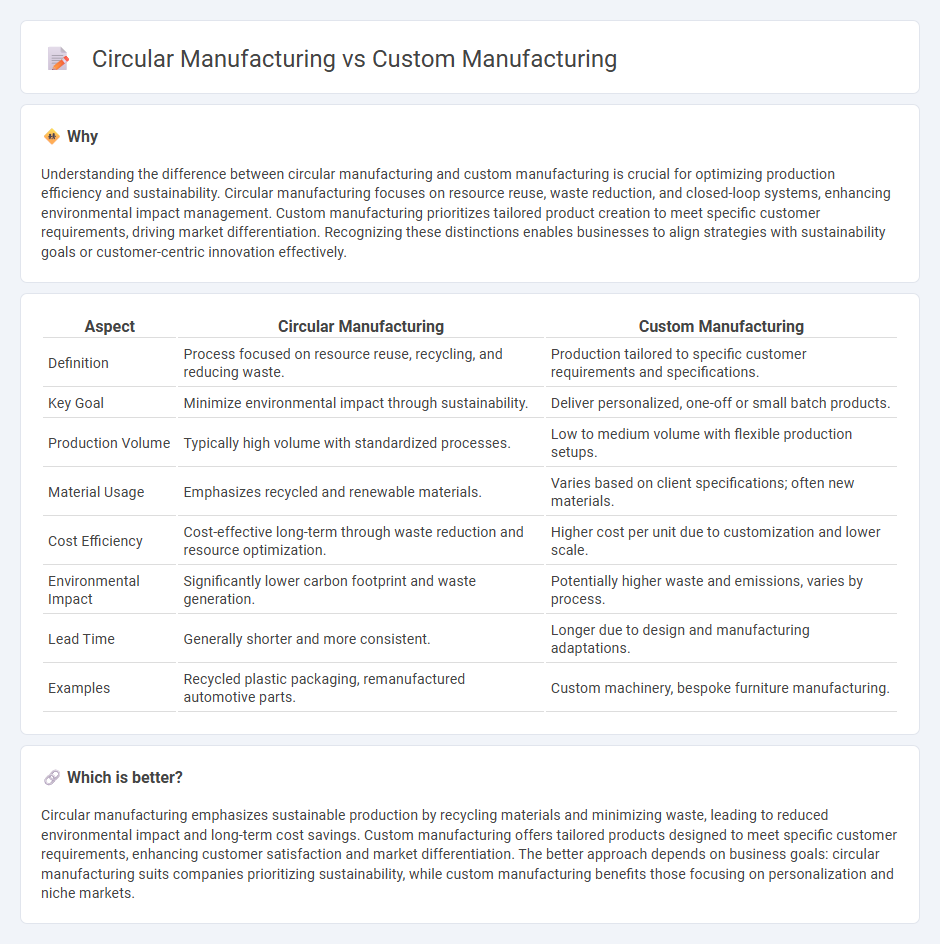
Circular manufacturing focuses on designing products and systems that maximize resource efficiency and minimize waste by reusing and recycling materials throughout the production lifecycle. Custom manufacturing emphasizes tailored production processes that meet specific client requirements, often resulting in unique, made-to-order products with a focus on flexibility and personalization. Explore the key differences and benefits of circular versus custom manufacturing to enhance your production strategy.
Why it is important
Understanding the difference between circular manufacturing and custom manufacturing is crucial for optimizing production efficiency and sustainability. Circular manufacturing focuses on resource reuse, waste reduction, and closed-loop systems, enhancing environmental impact management. Custom manufacturing prioritizes tailored product creation to meet specific customer requirements, driving market differentiation. Recognizing these distinctions enables businesses to align strategies with sustainability goals or customer-centric innovation effectively.
Comparison Table
| Aspect | Circular Manufacturing | Custom Manufacturing |
|---|---|---|
| Definition | Process focused on resource reuse, recycling, and reducing waste. | Production tailored to specific customer requirements and specifications. |
| Key Goal | Minimize environmental impact through sustainability. | Deliver personalized, one-off or small batch products. |
| Production Volume | Typically high volume with standardized processes. | Low to medium volume with flexible production setups. |
| Material Usage | Emphasizes recycled and renewable materials. | Varies based on client specifications; often new materials. |
| Cost Efficiency | Cost-effective long-term through waste reduction and resource optimization. | Higher cost per unit due to customization and lower scale. |
| Environmental Impact | Significantly lower carbon footprint and waste generation. | Potentially higher waste and emissions, varies by process. |
| Lead Time | Generally shorter and more consistent. | Longer due to design and manufacturing adaptations. |
| Examples | Recycled plastic packaging, remanufactured automotive parts. | Custom machinery, bespoke furniture manufacturing. |
Which is better?
Circular manufacturing emphasizes sustainable production by recycling materials and minimizing waste, leading to reduced environmental impact and long-term cost savings. Custom manufacturing offers tailored products designed to meet specific customer requirements, enhancing customer satisfaction and market differentiation. The better approach depends on business goals: circular manufacturing suits companies prioritizing sustainability, while custom manufacturing benefits those focusing on personalization and niche markets.
Connection
Circular manufacturing integrates sustainable design and resource efficiency to minimize waste, which aligns with custom manufacturing's focus on producing tailored products on demand, reducing excess inventory. Both approaches emphasize optimizing material use and extending product life cycles, contributing to economic and environmental sustainability. By combining circular principles with customization, manufacturers can create eco-friendly products that meet specific consumer needs while minimizing resource consumption.
Key Terms
Custom Manufacturing:
Custom manufacturing specializes in producing tailored products to meet specific client requirements, often involving small batch sizes or one-off items. This approach maximizes product uniqueness and flexibility, leveraging advanced techniques like CNC machining and additive manufacturing to achieve precise specifications. Explore how custom manufacturing can optimize your production process and fulfill unique market demands.
Personalization
Custom manufacturing emphasizes tailored production processes that meet individual customer specifications, enhancing personalization through bespoke designs and unique product features. Circular manufacturing integrates personalization with sustainability by enabling product customization within a closed-loop system, reducing waste while meeting consumer preferences. Explore how these innovative manufacturing models transform personalization in today's market.
Small-batch production
Small-batch production in custom manufacturing emphasizes tailored, one-of-a-kind products with flexible processes, enabling rapid adjustments to client specifications and minimizing inventory costs. Circular manufacturing integrates sustainable practices by designing products for reuse, remanufacturing, and recycling, reducing waste and resource consumption during small-batch runs. Discover how these manufacturing approaches optimize efficiency and sustainability in your production strategy.
Source and External Links
Custom Manufacturing: Processes, Benefits, and Applications - This webpage explores the processes and benefits of custom manufacturing, including additive and subtractive manufacturing techniques.
Custom Manufacturing: What it is and How It Can Help You to Succeed - This article explains how custom manufacturing tailors products to meet specific customer needs, offering a competitive edge in the market.
Custom Manufacturing | OneMonroe - Monroe Engineering - This page highlights OneMonroe's custom manufacturing services, including built-to-order parts and support for high volume production with short lead times.
 dowidth.com
dowidth.com